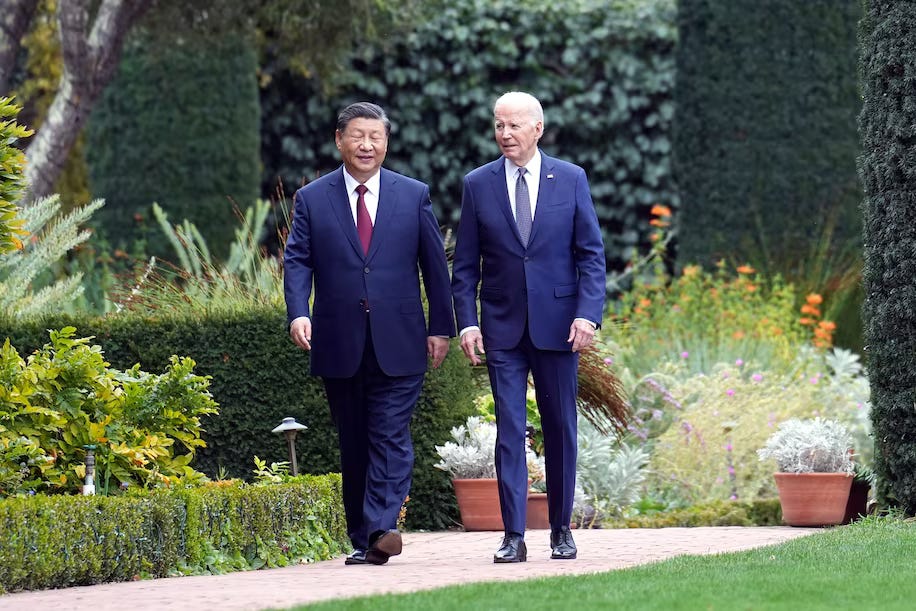A Diplomatic Bridge over the Pacific: The Biden-Xi tête-à-tête in San Francisco's Suburbs
It may be premature to label this as a détente, but it's evident that the frosty relationship has significantly thawed.

A Historic Meeting at Filoli Estate
In the the sylvan surroundings of Filoli Estate, a renowned country house and museum situated about 25 miles south of San Francisco, U.S. President Joe Biden and Chinese President Xi Jinping met on Wednesday, November 15, for a historic meeting. The meticulously arranged rendezvous, lasting four hours, comprised of intensive discussions, a working lunch, and a leisurely garden stroll. This summit, set against the arboreal backdrop of Northern California, symbolized a significant effort by both leaders to demonstrate that their global economic rivalry need not escalate into a confrontational deadlock.
Direct Communication: A Step Forward
A key outcome from the discussions was the establishment of a direct line of communication for urgent matters. "We should pick up the phone and call one another and we’ll take the call. That’s important progress," Biden remarked at a news conference following the talks. This commitment to open dialogue marked a pivotal step in managing the complexities of the U.S.-China relationship.
The conversation between the two leaders was marked by a recognition of the vast potential for mutual success. "Planet Earth is big enough for the two countries to succeed," Xi assured Biden, highlighting the scope for collaborative prosperity, while subtly alluding to China’s sphere of influence in both the Pacific and Indian Oceans. Biden echoed this sentiment, emphasizing the importance of clear, leader-to-leader communication to prevent competition from spiraling into conflict.
In-Depth Discussion on Taiwan
The Taiwan issue was a major focus of the dialogue, marked by contrasting perspectives. Biden emphasized the U.S.'s unwavering commitment to helping Taiwan defend itself. On the other hand, Xi, while reassuring that China had no plans for an invasion, remained adamant about Taiwan's reunification with China. This discussion underscored the delicacy and complexity of the Taiwan issue in U.S.-China relations. It should be noted that China views Taiwan as a renegade province and typically responds with disfavor to any nation that seeks to forge closer ties with Taiwan.
Addressing Global Security: The Middle East and Iran
The talks also delved into broader global security issues, particularly the situation in the Middle East and Iran's role in regional dynamics. Biden urged Xi to leverage China's influence over Iran, highlighting the need for Tehran and its proxies to refrain from actions that could exacerbate the Israel-Hamas conflict. This part of the discussion underscored the global reach of U.S.-China relations and the impact of their interactions on worldwide geopolitical stability.
Combating Illegal Fentanyl Production
A key area of agreement was the joint effort to combat illegal fentanyl production, addressing a critical public health and drug addiction issue. The U.S. has long been concerned about the influx of synthetic fentanyl, much of which originates from China. This collaboration signifies a shared commitment to tackling this transnational crisis. India could also potentially benefit from this agreement.
Addressing Human Rights: A Core Element of Diplomacy
"President Biden underscored the universality of human rights and the responsibility of all nations to respect their international human rights commitments," stated the White House's readout of the talks. Shorn of diplomatic niceties, what this means is the President Biden raised concerns about China's human rights abuses in Xinjiang, Tibet, and Hong Kong. This part of the conversation reflects a fundamental aspect of U.S. foreign policy, balancing strategic interests with the advocacy of universal human rights principles, a cornerstone in managing complex international relationships.

Pandas as Ambassadors of Peace
In the midst of diplomatic dialogues, 'panda diplomacy' stood out as a heartwarming symbol of goodwill. President Xi Jinping’s commitment to send new pandas to the U.S. was a gesture rich in tradition, highlighting these endearing animals as ambassadors of peace. This announcement, closely following the return of three pandas from the Smithsonian National Zoo to China, resonated deeply with the American public, particularly children, echoing the strong cultural and emotional bonds formed through this unique diplomacy. “Pandas have long been envoys of friendship between the Chinese and American people,” Xi noted, reaffirming China's dedication to ongoing panda conservation collaboration with the U.S. In a landscape often fragmented by geopolitical complexities, panda diplomacy emerges as a beacon of shared values and unity, emphasizing the role of nature and wildlife in fostering international harmony.
Implications for India
From an Indian viewpoint, the amicable Biden-Xi meeting is laden with considerable significance. As India steers its strategic relationships with these global powers, the apparent reduction in tensions could herald new opportunities for diplomatic and economic collaborations within the Indo-Pacific sphere. This scenario positions India advantageously to both gain from and contribute to a more equilibrated geopolitical environment.
Contrasting this perspective, a dissenting voice from Subramanian Swamy, a former BJP leader, known for his criticism of Prime Minister Modi, surfaced on social media. He tweeted, "The cordial meeting of Xi and Biden represents also Modi’s monumental decline in global politics. India’s national security has also been decimated.1" This statement, arguably reflecting personal frustration, seems to overlook the intricate layers and subtleties of international diplomacy, suggesting a somewhat one-dimensional interpretation of the evolving global dynamics.
Bridging Differences, Embracing Cooperation
Overall, the Biden-Xi summit at Filoli Estate marked a crucial juncture in U.S.-China relations. Amidst global economic challenges and geopolitical tensions, the meeting offered a platform for both nations to navigate their differences while seeking avenues for cooperation. The commitment to direct communication and the recognition of shared global responsibilities reflect a significant, albeit cautious, step towards a more stable and collaborative international order.
Footnote: DEL vs. SFO
Those critical of the Delhi Police for displacing beggars from New Delhi's streets during the G-20 summit in September this years might find a degree of consolation in learning that similar actions were undertaken in San Francisco. There, the local police cleared areas typically squatted by the homeless, including some upscale and downtown regions, to secure the routes for VVIPs during the high-profile event. This action, which deviates from the usual non-interference approach in these areas, mirrors the efforts to present an unblemished façade during significant international events.
https://x.com/Swamy39/status/1725070541298753854?s=20





